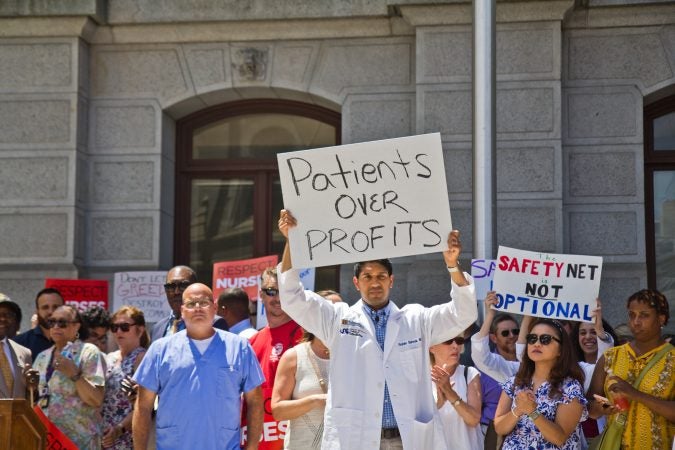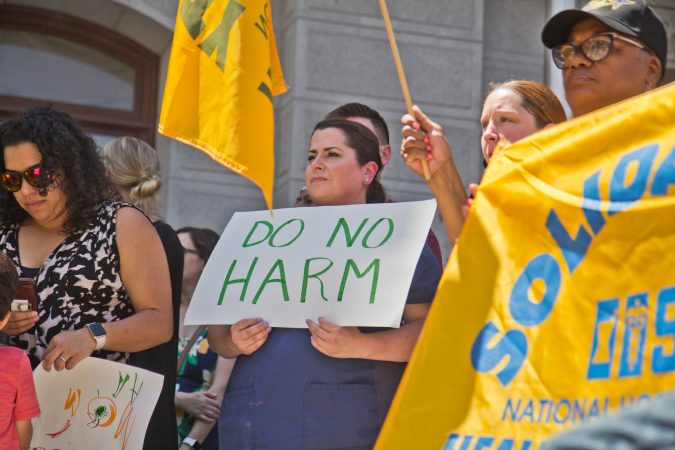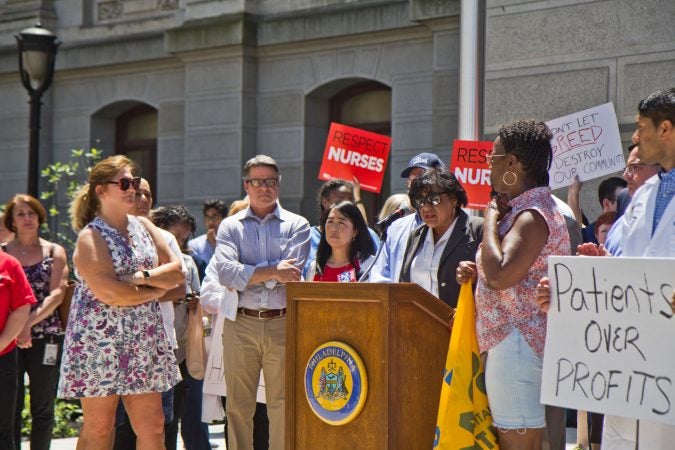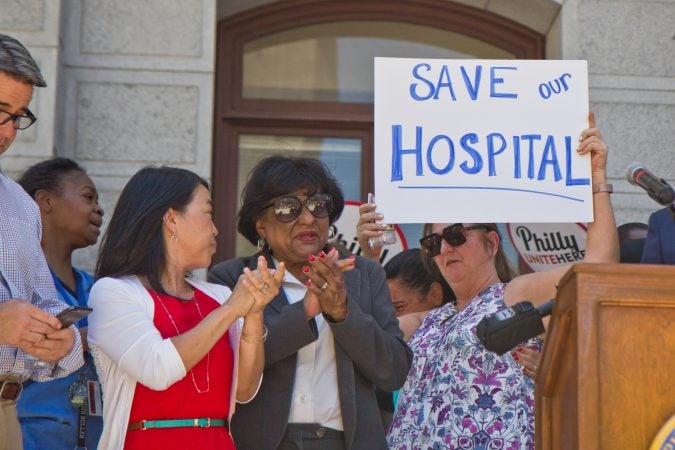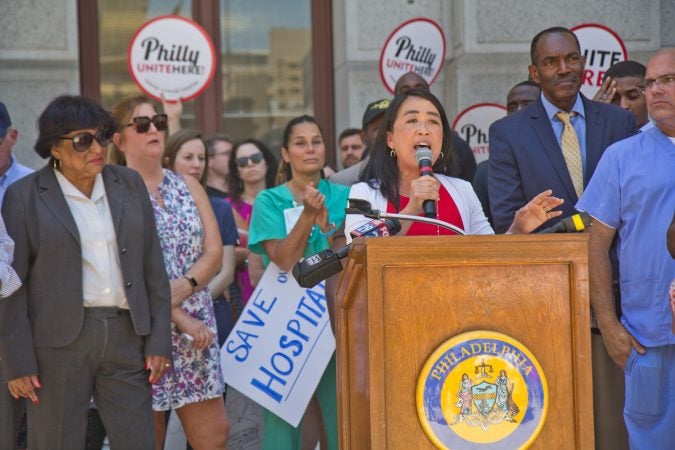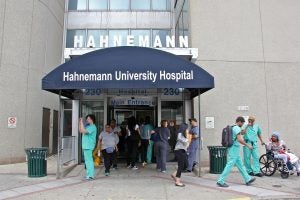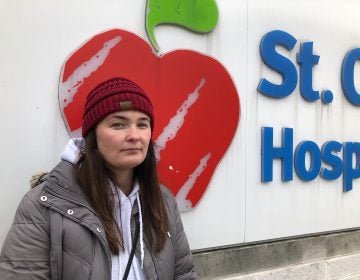Hahnemann’s fate is uncertain, but patients and staff are already feeling the pain
Citing concerns about loss of ER services, Pa. Health Secretary Rachel Levine says the hospital’s owners must give 90 days’ notice before shutting.
Listen 3:33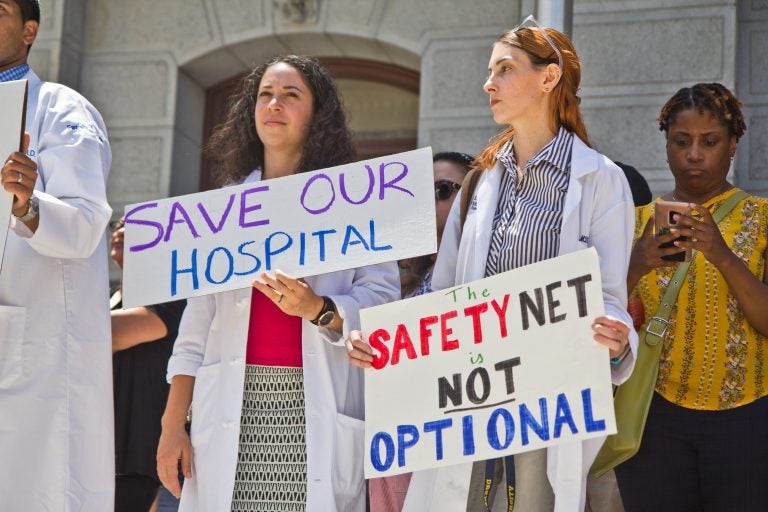
Hahnemann employees, city officials, and unions rally against the closing of the hospital. (Kimberly Paynter/WHYY)
With the fate of Hahnemann University Hospital hanging in the balance, hundreds of doctors, nurses and other employees took to the apron in front of City Hall Thursday to demand that the historic, safety-net facility remain open. They were joined by the unions that represent them and half a dozen or so Philadelphia City Council members, who spoke in defense of the hospital.
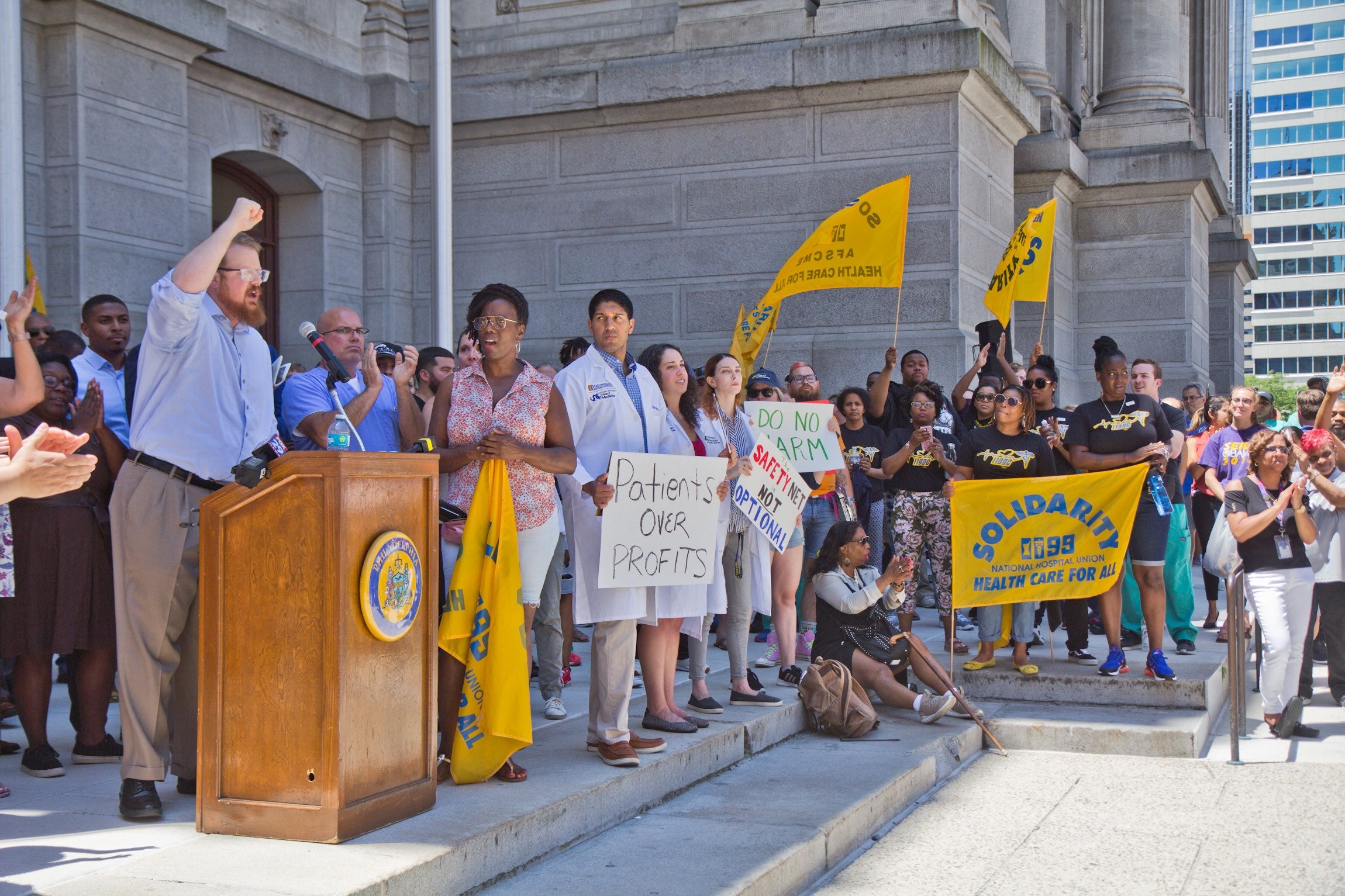
About the same time, the Pennsylvania Department of Health ordered Philadelphia Academic Health System LLC, Hahnemann’s owner, to cease and desist any action toward closing the hospital until an appropriate plan for closure is delivered to the department.
“Hahnemann has had a vital part in the community’s health, and so they can’t just say that they’re going to stop treating patients without an in-depth plan about how that’s going to happen,” Health Secretary Rachel Levine said in an interview.
Levine said she needed to see a plan detailing how each department at Hahnemann would coordinate patient care with corresponding departments at other hospitals throughout the city, as well as with the Philadelphia and Pennsylvania health departments. She was especially concerned that Hahnemann was planning to immediately end emergency services, coinciding with the start of the Fourth of July holiday celebrations in the city.
Gov. Tom Wolf issued a statement supporting Levine’s letter. As of Thursday evening, Levine said, her department had not received any response from the hospital’s owners.
Philadelphia Academic Health System said in a statement: “We acknowledge receipt of the DOH letter, and as we have said from the start, we intend to conduct the closure in an orderly manner that prioritizes the health-care needs of our patients.”
At Thursday’s noon protest rally, as hospital advocates and City Council members cited the economic impact of 3,000 lost jobs, Hahnemann staff and patients said the hospital’s closing would mean the loss of something less tangible: a strong community of hardworking, caring providers.
In a sense, a family.
“It’s certainly not the most beautiful hospital in the city, and it’s certainly not the newest,” said Shawn Mattson, who just completed her OB/GYN residency through Drexel School of Medicine and had just signed on to remain at Hahnemann as an attending physician beginning in August. “But it’s an incredibly special place, where people go above and beyond in caring for their patients, in caring for one another.”
Mattson went through her entire medical education at Hahnemann, which serves as the main teaching hospital for Drexel. She said that for residents, the hospital’s closing would essentially uproot everything they had done to build their reputation as doctors.
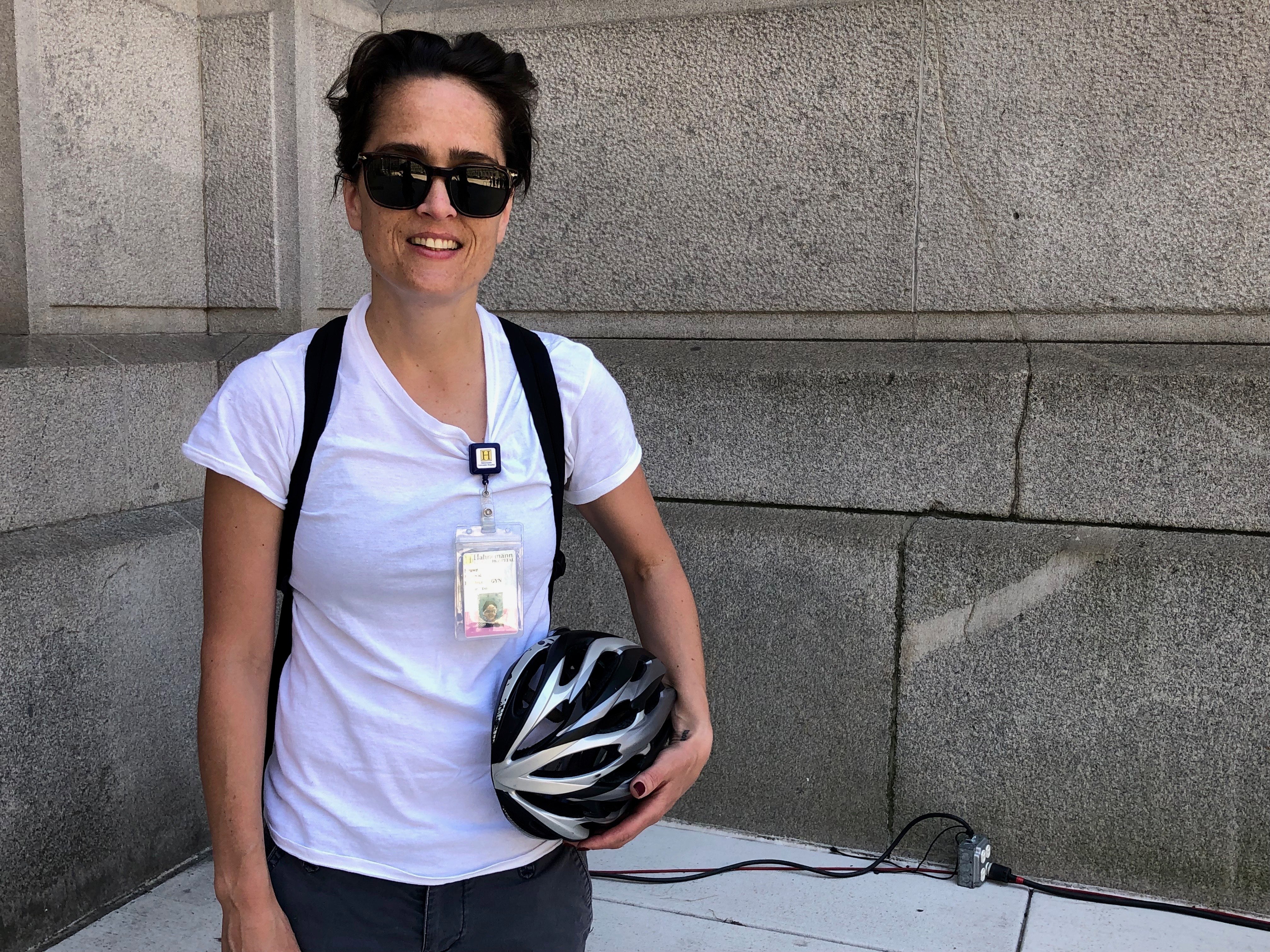
“You’re a fourth-year and you’re starting all over in a place where you don’t know anybody, they don’t know you, and you’re supposed to be at the peak of your learning how to manage and be in charge,” she said.
Many medical residents who matched at Hahnemann this year just underwent or are currently undergoing an orientation period. Mattson said she could not imagine the stress of not knowing what comes next in their position.
“They signed on for something that’s going to be something entirely different,” she said.
For many, like Mattson, Philadelphia is home. Leaving for a different placement would not only shake up their professional lives, but also their personal lives. Some Hahnemann residents from other countries have visas contingent on an active placement. Others have children in Philadelphia schools, mortgages on homes, partners with jobs elsewhere in the city, which makes uprooting logistically and emotionally complicated.
Ellen Wolf, a labor and delivery nurse who has lived in Philadelphia her whole life and has worked at Hahnemann for the past five years, said that if the hospital closes she has no idea where she would go.
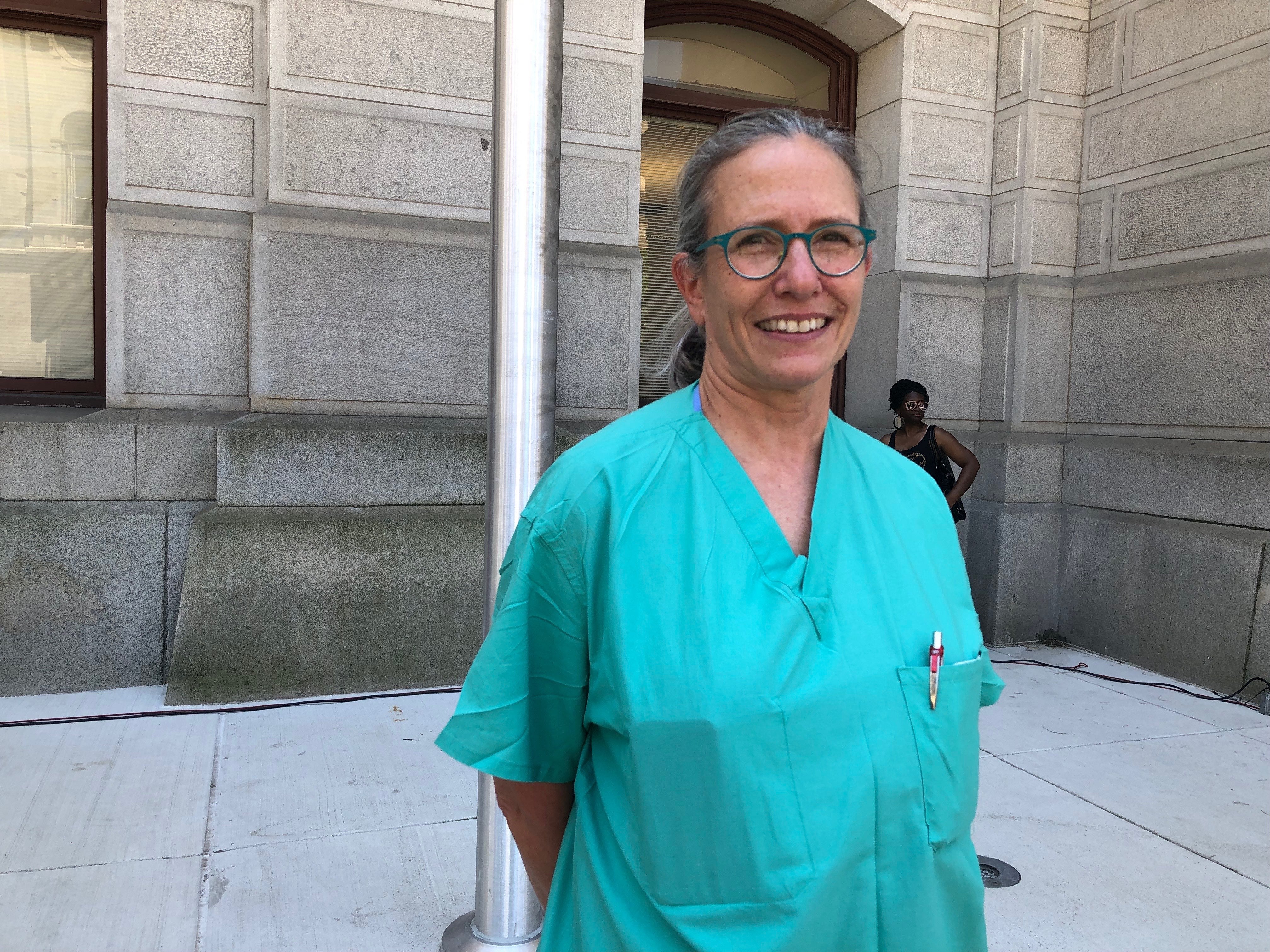
“I don’t even know, my head is spinning,” said Wolf, who will be 62 in August. “I’m a little concerned about who’s gonna hire me, cause I’m an old lady now.”
Though news of the hospital’s closing came as a surprise to many, signs of its financial distress had been building for months.
Hahnemann was purchased in January 2018 by American Academic Health System, parent of Philadelphia Academic Health. The owner announced 175 layoffs in April of this year.
“When the layoffs came, that’s when we knew we were in trouble,” said Bernard Brooks, who has been working at the hospital for 34 years.
Brooks manages supplies coming into the hospital for the operating rooms, and he said it wasn’t uncommon for certain equipment to be unavailable or short-stocked. He gave the example of a tubing necessary for orthopedic knee surgery.
“For like almost a month, we didn’t get none in, and I just thought it was because the manufacturer was having a back order,” said Brooks, a member of the local chapter of the National Union of Hospital and Health Care Employees. “It was because they put a credit hold on it. That was the reason. And they couldn’t do too many knee surgeries at that time.”
Multiple employees noted that nurses were short on linens and rags, making it impossible to bathe patients or change bedding as often as necessary.

One medical resident, who spoke on the condition of anonymity for fear of retribution from hospital leadership, recounted that for a period of several weeks, only one elevator was working out of a bay of six used to transport patients and staff.
“The ICU is on the 21st floor,” said the resident. “If a code is called, residents have to respond. If you’re eating on the second floor, that means you have to run up 20 flights of stairs.”
Despite the substandard conditions, the resident said, the overall attitude at the hospital was one of grit and determination — that the medical professionals there could deliver the same quality of care in worse circumstances.
“We’re a poor inner-city hospital, we serve a vulnerable population, and we’re OK with that — we’re not Penn and we’re never going to be,” said the resident. “That is the mindset. Residents say you can leave this hospital and work at any hospital because if you can work here you can make it anywhere.”
Now, that mantra may be put to the test.
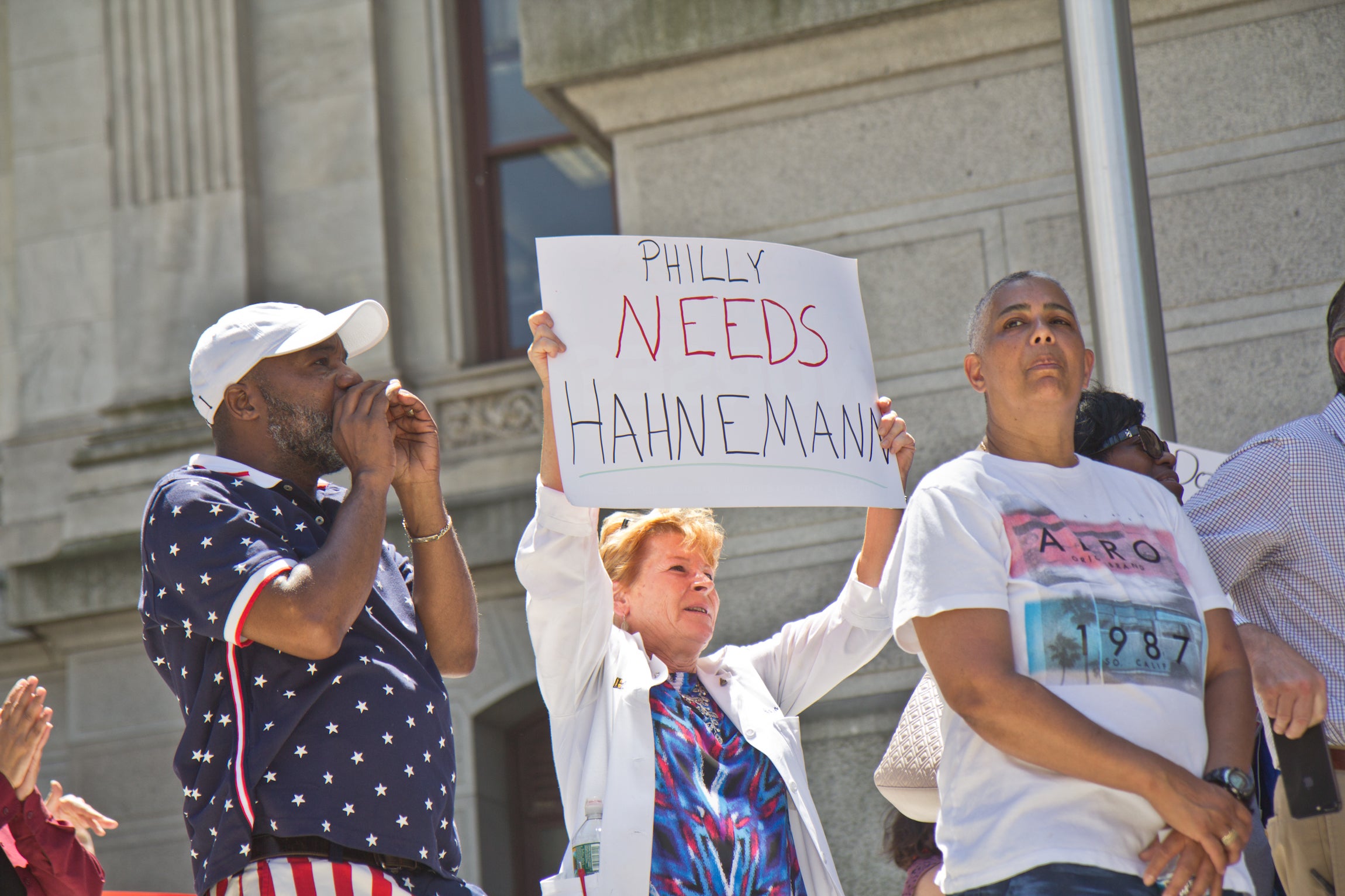
Because of the shortage of supplies and executive-leadership turnover, residents said they were concerned. They had been in meetings with their program leadership as recently as last week to make sure that Hahnemann wasn’t in imminent danger. They had been assured that everything was fine, and told to keep their focus on patient care.
Indeed, all the medical professionals who spoke to WHYY News agreed that were the hospital to close, the greatest loss would come to the patients.
Edna Devlin is 73 years old and has been going to Hahnemann since she was a teenager. She receives state medical assistance and sees doctors at Hahnemann for a variety of conditions: her COPD, her emphysema, her diabetes. In April, she had knee surgery, and her doctors told her that they will need to operate on the other one, too. She doesn’t know where she’ll go for that.

“They know me, they know my ailments and everything,” said Devlin, in tears at the prospect of Hahnemann closing. “They’ll take all my paperwork to a new hospital, then I gotta start all over telling ‘em what’s wrong with me, when they can just hit a button in there with my name and Social Security number and everything come up about me.”
Devlin, who lives at 7th and Spring Garden streets, also said she worried about what the loss of the Level 1 trauma center so close at Broad and Vine would mean for her neighborhood.
“My kids called me last night and said, ‘Ma, where you gonna go if there’s an emergency?’ I’m not going way up there to no Temple Trauma. They got enough up there with the shootings and knives,” she said.
After her knee surgery at Hahnemann in April, Devlin was supposed to go straight home. But she didn’t want to.
“I didn’t go home for two days, ‘cause I had to learn how to take care of myself,” she said, this time with a laugh. “They let me stay. They took care of me.”
WHYY is your source for fact-based, in-depth journalism and information. As a nonprofit organization, we rely on financial support from readers like you. Please give today.


